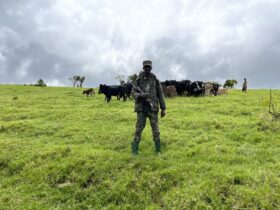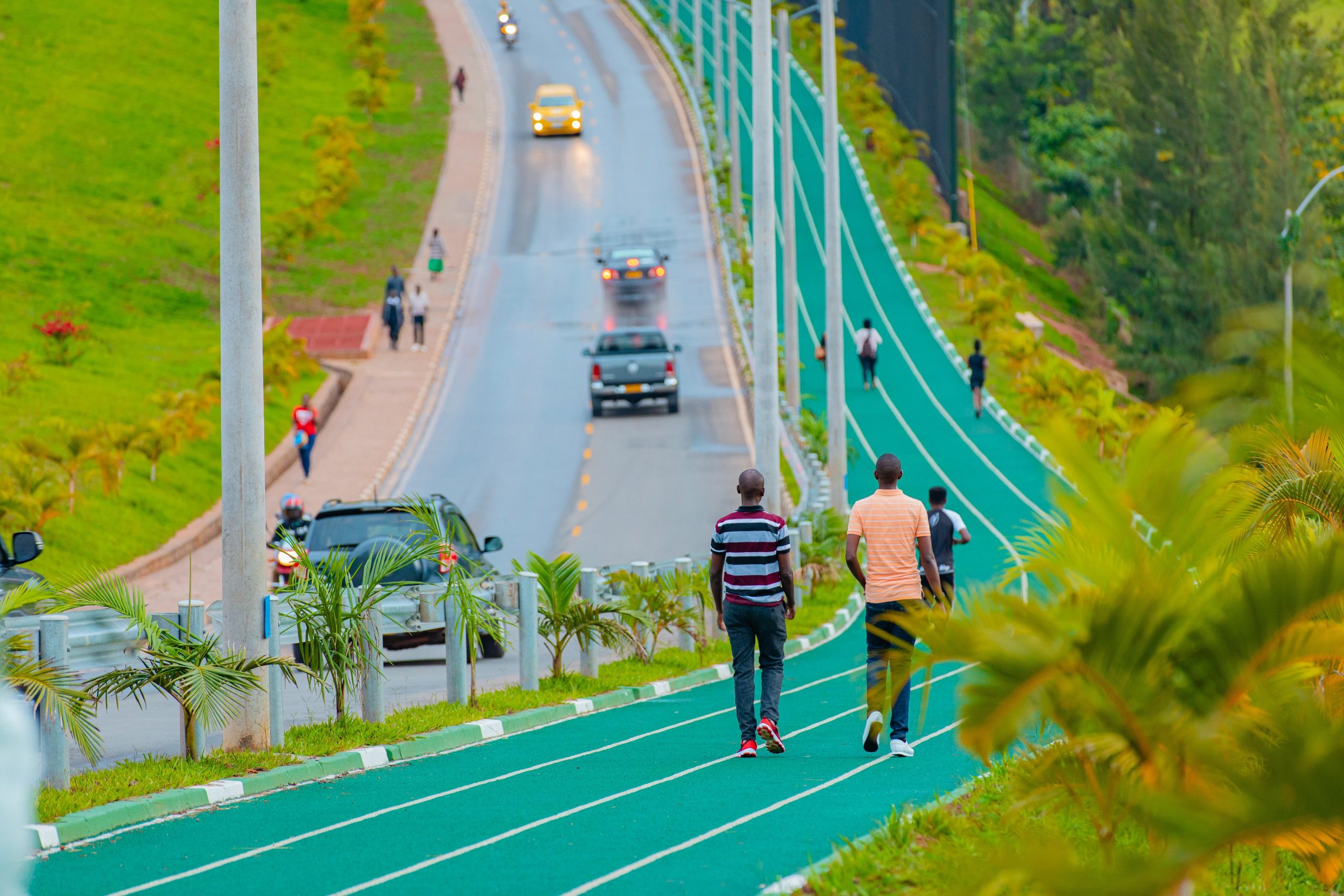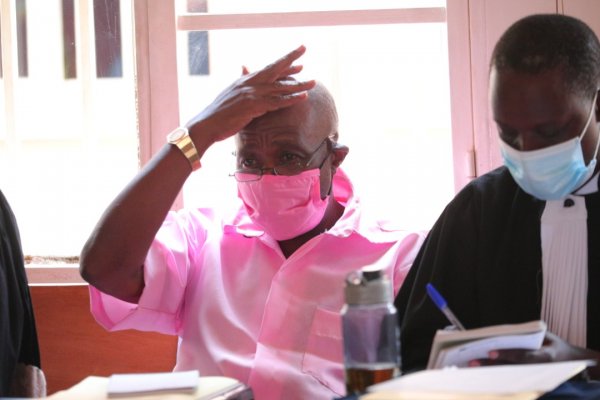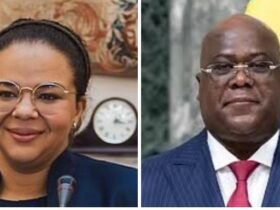On December 17th 2018, the German foreign service issued a travel advisory encouraging German citizens to ‘eschew travelling to Rwanda’s western regions’. ‘There are increased risks of terrorist attacks in the area of the Nyungwe Forest and on the road connecting Rusizi and Nyamagabe and in the vicinity of Virunga National Park.’ In December 2018, the advisory proceeds, ‘several buses were stopped by gunmen in Nyungwe Forest and travellers were killed. Several Kinigi residents were killed in early October 2019.’ The German official website reads.
These attacks were claimed by an anti-Rwanda movement called the Rwandan Movement for Democratic Change (MRCD) and its military wing: Forces for National Liberation (FNL) led by one Paul Rusesabagina.
Mr. Rusesabagina was made famous by a Hollywood movie ‘Hotel Rwanda’, in which his character featured actor Don Cheadle, presenting him as Rwanda’s Schindler who saved 1268 people seeking refuge at the four-star Hotel des Milles Collines in Kigali during the Genocide against the Tutsi. However, those who survived at the hotel, as well as the UN peacekeepers who saved them, tell a different story.
Earlier, on 26 Aug 2018, one Calixte Nsabimana, known as Sankara, claiming to be the spokesperson of Rusesabagina’s rebel outfit, told BBC’s Kinyarwanda that the NLF had been at war for a month with the Rwandan army. It did not take long for Calixte Sankara to be arrested in the isles of Comoros.
Reacting to his arrest on 23rd April 2019 on the Voice of America, Paul Rusesabagina dismissed possibilities for Sankara’s extradition. ‘He was arrested last Friday, the government of Rwanda had sent means, including money and an airplane. We got wind of it and lobbied Comoros’ authorities to stop the extradition. Sankara is in safe hands, we have deployed people to protect him’. Asked to confirm Sankara’s claims of FNL presence in Rwanda, Rusesabagina remarked: ‘We didn’t go to the Nyungwe forest to relinquish it the next day; we are there to stay!’ Sankara was eventually extradited to Rwanda on April 16, 2019.
Far from discouraging him, on 18th June 2019 Rusesabagina enters a coalition with extremist Rwandan diaspora based in Belgium, and on 25th December 2019, he appears in front of the camera to deliver a New Year’s message. The caption reads: MRCD, FNL president: ‘The time has come for us to use any means possible to bring about change in Rwanda. As all political means have been tried and failed, it is time to attempt our last resort. Hence, he proceeds: ‘I pledge my unreserved support that our youth, the National Liberation Forces (NLF) lunched against Kagame’s army in order to free the Rwandan people.’ ‘The RMDC calls upon the international community to isolate the RPF government and pressurize it as the only way to avoid conflict’, Rusesabagina finally declares.
Mr. Rusesabagina’s declarations a year after the attacks in western Rwanda was a culmination of years of investigation by America’s FBI, a search at his house and questioning by the Belgian police, all followed by the issuance of international arrest warrants against him.
An interview published on July 2nd 2020 by Jambonews.net, a website run by Europe-based children of genocide perpetrators and dignitaries of the defeated regime, features one Francine Umubyeyi, chairperson of the ‘National Council of Renewal and Democracy’ (CNRD), an offshoot of Rusesabagina’s MRCD, who promised further attacks: ‘Since June 2018 our soldiers, the FLN conducted attacks in the south of Rwanda before moving into Nyungwe forest where it has been based for two years. We reserve the right to remove the dictatorial regime by any means necessary, before comparing their MRCD coalition to the Rwandan Patriotic Front (RPF), ostensibly because the RPF took power through war.
MRCD is no RPF: The RPF was fighting to bring back a Tutsi diaspora that had been denied return to Rwanda, while Tutsi from within the country were systematically oppressed. But most importantly, the RPF stopped the genocide against the Tutsi. While the RPF members had committed no crime in Rwanda before they were forced to flee in the anti-Tutsi pogroms of the late fifties and early sixties, the MRCD and its allied groups, including the ‘Front of Liberation of Rwanda’ (FDLR), are genocide perpetrators on the run, their offspring and genocide deniers; all of whom have never been denied peaceful return to Rwanda. As an illustration: all three children of Ntawunguka Pacifique, the current head of FDLR, returned to Rwanda, were freely enrolled with their colleagues in the national university, then benefited from RPF-led government’s scholarships to pursue post-graduate studies in Ghana and in China. Such cases are commonplace in Rwanda. To put things in perspective: Children of the leader of a terror organisation with a declared mission to topple the RPF-led government are benefiting scholarships from the same RPF-led government.
But this article isn’t about the heroism of Mr. Paul Rusesabagina, nor the alleged nobility of his terror organization. It isn’t impugning Rusesabagina’s acquired Belgian citizenship nor his American resident status. As far as we are concerned, he could be a citizen of Vatican-city, an inhabitant of Tahiti, Bora-Bora or the grand mufti of Palestine; None of that has any bearing on the crimes he is answering for. This is the story of a man who declared war on a legitimate government. Paul Rusesabagina may as well be the hero depicted in the Hollywood picture, however, the moment he forms a military outfit, declares war on Rwanda and conducts attacks which kill innocent civilian, his hero status, real or made-up citizenship and the many accolades acquired by stealth for impersonating the hero he never was, all become irrelevant and any means for his arrest are legitimate.
In Stephen Kinzer’s ‘A Thousand Hills: Rwanda’s Rebirth and the Man Who Dreamed It’, and in ‘Man of Steal’, a conversation with Jeune Afrique’s Francois Soudan, Rwanda’s President Paul Kagame narrates his journey from Fort Leavenworth in America where he was undergoing senior military command training, to join the Rwandan Patriotic Front which had launched an armed struggle against the Rwandan government of the time.
President Kagame explains how he evaded the French, Belgian, Rwandan intelligences and Interpol in the airports of London and Addis-Ababa, entered Kampala in secret and travelled in the wee hours to join his hitherto troupes in the bush. His status had changed overnight: from an officer of a legitimate Ugandan government to an international fugitive. Had Habyarimana’s government arrested him then, it would have been within its rights.
This is not true for Rwanda only, we all remember the arrest and trial of Oriol Junqueras, the deputy leader of Catalonia secessionists, arrested and sentenced to 13 years in prison for sedition, while Carles Puigdemont its former leader has been hiding in Belgium, with impending European arrest warrants on his head.
We also remember the Basque separatist movement ‘Euskadi Ta Askatasuna’ (ETA), who’s top leaders Francisco Mujika Garmendia, José Luis Alvarez Santacristina and José María Arregi Erostarbe were arrested in 1992 and sentenced to an astounding 2.354 years in prison for bombing, assassinations and kidnappings in the Southern Basque Country between 1968 and 2010, killing over 829 people, including 340 civilians.
Paul Rusesabagina, sadly, did not grasp the turning of the tide, from an internationally acclaimed Hollywood star, to a terrorist on Interpol and Rwanda’s most wanted lists. He wanted to have his cake and eat it. In his own words, he is instead eating pasta and drinking porridge in a Kigali prison. He is indicted for 13 criminal charges, including terrorism, complicity in kidnap, murder and forming a rebel group. In court last month, Rusesabagina admitted to forming a rebel group, as finally reported by America’s ‘Washington Post’.















Leave a Reply